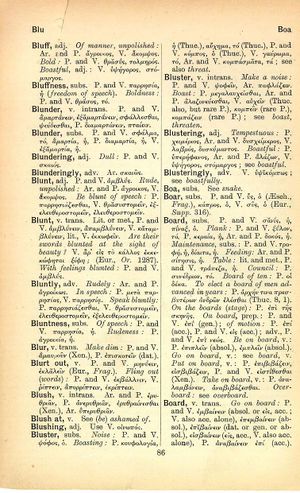boa: Difference between revisions
Περὶ τοῦ ἐπέκεινα τοῦ νοῦ κατὰ μὲν νόησιν πολλὰ λέγεται, θεωρεῖται δὲ ἀνοησίᾳ κρείττονι νοήσεως → On the subject of that which is beyond intellect, many statements are made on the basis of intellection, but it may be immediately cognised only by means of a non-intellection superior to intellection
m (Text replacement - "link={{" to "link={{") |
m (Text replacement - "}}]]" to "}}]]") |
||
| Line 1: | Line 1: | ||
{{Woodhouse1 | {{Woodhouse1 | ||
|Text=[[File:woodhouse_86.jpg|thumb | |Text=[[File:woodhouse_86.jpg|thumb | ||
|link={{filepath:woodhouse_86.jpg | |link={{filepath:woodhouse_86.jpg}}]]'''subs.''' | ||
See [[snake]]. | See [[snake]]. | ||
Revision as of 10:11, 15 August 2017
English > Greek (Woodhouse)
subs.
See snake.
Latin > English (Lewis & Short)
bŏa: (also bŏva in the MSS. of Pliny and Festus), ae, f. bos; cf. βουβών,
I a large Italian serpent: in Italiă appellatae bovae in tantam amplitudinem exeuntes ut divo Claudio principe occisae in Vaticano solidus in alvo spectatus infans, Plin. 8, 14, 14, § 37; 30, 14, 47, § 138 sq.; Sol. 2; acc. to Paul. ex Fest. p. 30 Müll., a water-serpent, so called because it milked cows, Sol. 2, 33; or because it could swallow an ox, quas boas vocant, ab eo quod tam grandes sint ut boves gluttire soleant, Hier. Vit. Hil. Erem. 39.—
II A disease producing red pustules, the measles or small-pox, Plin. 24, 8, 35, § 53: boam id est rubentes papulas. id. 26, 11, 73, § 120: boas fimum bubulum abolet: unde et nomen traxere, id. 28, 18, 75, § 244; Lucil. ap. Fest. s. v. tama, p. 360 Müll.—
III Crurum quoque tumor viae labore collectus bova appellatur, Paul. ex Fest. p. 30 Müll. (the same author explains with these words the disease tama).
Latin > French (Gaffiot 2016)
(1) bŏa (bŏva, bŏas), æ, m.,
1 le serpent boa : Plin. 8, 37
2 enflure des jambes par suite d’une marche pénible : P. Fest. 30 || rougeole [maladie] : Plin. 24, 53.
Latin > German (Georges)
(1) boa1 u. (urspr., aber archaist.) bova, ae, f. u. boba, ae, f., I) eine Art Wasserschlange, die sich gern an Kühe ansaugt, Form boa, Plin. 8, 37 u.a. Solin. 2. § 33 u. 34: Form bova, Varr. sat. Men. 329. Paul. ex Fest. 30, 13. Form boba, Plac. gloss. V, 8, 9. – II) übtr.: a) (Form boa) die durch Kuhmist zu heilende Krankheit der roten Blattern, die Wasern, franz. la rougeole, Plin. 24, 53 u.a.: Form boba, Placid. gloss. V, 8, 9. – b) (Form bova) die durch Gehen rot angeschwollenen Adern der Schenkel, Adergeschwulst, Lucil. sat. fr. inc. 39 (bei Fest. p. 360, 21 boa; bei Paul. ex Fest 30, 13 bova). – c) (Form bova) ein einer boa ähnliches Weingefäß, die Weinschlange, Varr. sat. Men. 329.

